9 Best Herbal Creams For Dry Scalp
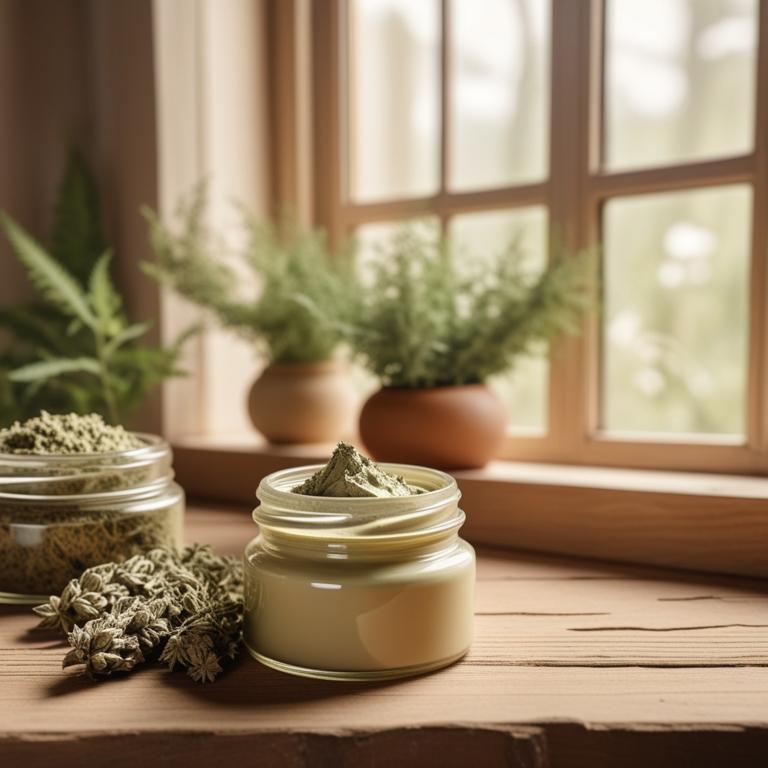
Herbal creams for Dry scalp are topical preparations made from natural ingredients, such as herbs, essential oils, and plant extracts, designed to soothe and relieve the discomfort associated with dry scalp conditions.
These creams offer numerous benefits, including reducing inflammation, promoting healthy hair growth, and providing long-lasting relief from itching and flaking.
Some popular examples of herbal creams for dry scalp include tea tree oil cream, which has antifungal properties to combat fungal infections; aloe vera cream, which moisturizes and calms the scalp; chamomile cream, which soothes and relaxes the scalp; peppermint oil cream, which stimulates blood flow and reduces inflammation; and coconut oil cream, which nourishes and hydrates the scalp.
By using these herbal creams, individuals can effectively treat their dry scalp condition and enjoy a healthier, more comfortable scalp.
According to "Current topics in medicinal chemistry", creams for dry scalp may contain alternative therapies such as tea tree oil, thyme, and Aloe vera, which have been reported to demonstrate anti-dandruff activity by disrupting microbial growth associated with dandruff formation.
Below there's a list of the 9 best herbal creams for dry scalp.
- 1. Aloe barbadensis creams
- 2. Rosmarinus officinalis creams
- 3. Melaleuca alternifolia creams
- 4. Urtica dioica creams
- 5. Calendula officinalis creams
- 6. Hypericum perforatum creams
- 7. Santalum album creams
- 8. Cymbopogon citratus creams
- 9. Melissa officinalis creams
Also you may be interested in...
TODAY'S FREE BOUNDLE
Herb Drying Checklist + Herbal Tea Shopping List + Medicinal Herbs Flashcards
Enter you best email address below to receive this bundle (3 product valued $19.95) for FREE + exclusive access to The Aphotecary Letter.
$19.95 -> $0.00
1. Aloe barbadensis creams
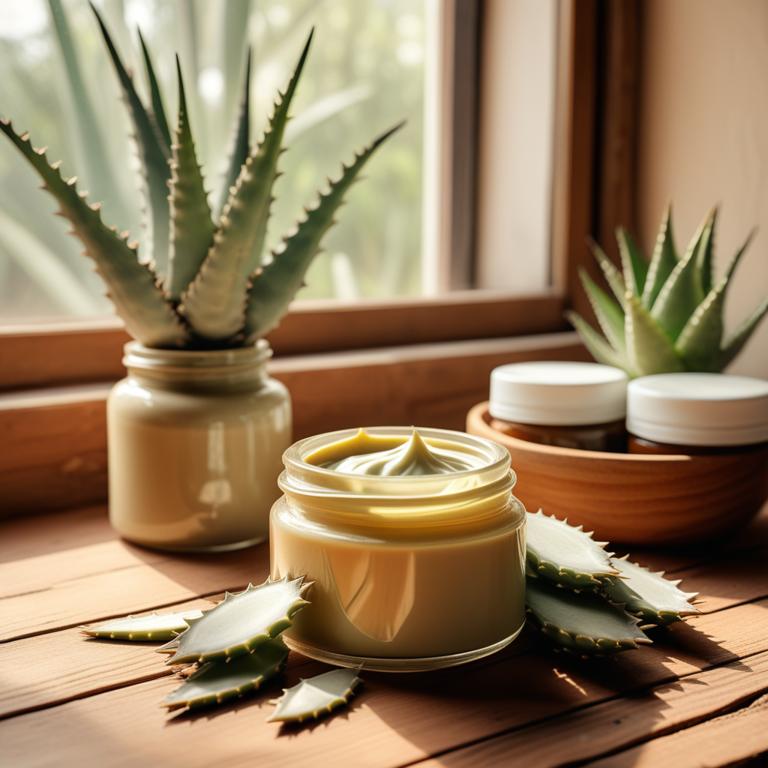
Aloe barbadensis creams, derived from the gel of the aloe vera plant, have been effectively used to treat dry scalp ailments due to their soothing and moisturizing properties.
The anti-inflammatory and antiseptic properties of aloe vera help to reduce redness and itching associated with a dry scalp, promoting a healthy scalp environment.
The bioactive constituents of aloe vera, including aloin and aloe-emodin, exhibit antimicrobial and antioxidant activities that help to control fungal and bacterial infections, while also reducing oxidative stress and promoting wound healing.
Regular application of aloe barbadensis creams can provide significant relief from dry scalp conditions, including dandruff and eczema, by hydrating and calming the scalp, thus promoting a healthy and balanced scalp ecosystem.
2. Rosmarinus officinalis creams
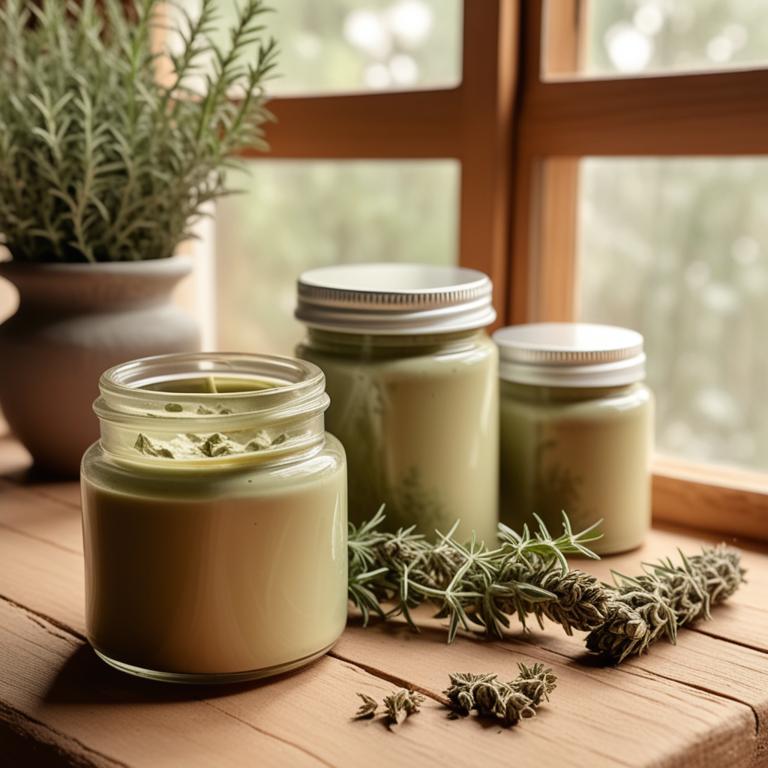
Rosmarinus officinalis creams have been traditionally used to treat the dry scalp ailment due to their anti-inflammatory and antifungal properties, which help to soothe and calm the scalp.
The bioactive constituents of Rosmarinus officinalis, such as carnosic acid and rosmarinic acid, exhibit potent antioxidant and anti-inflammatory activities, thereby reducing inflammation and promoting healthy scalp tissue.
By reducing inflammation and preventing fungal growth, Rosmarinus officinalis creams help to alleviate symptoms of dry scalp, including itching, flaking, and redness.
The benefits of using Rosmarinus officinalis creams to treat dry scalp include improved scalp health, reduced irritation, and a decrease in the risk of further complications, making it a natural and effective remedy for this common condition.
Related Study
According to the study, Rosmarinus officinalis creams for dry scalp may be beneficial as the essential oils from Rosmarinus officinalis have shown activity against Malassezia species, which can cause dandruff and other skin disorders.
3. Melaleuca alternifolia creams
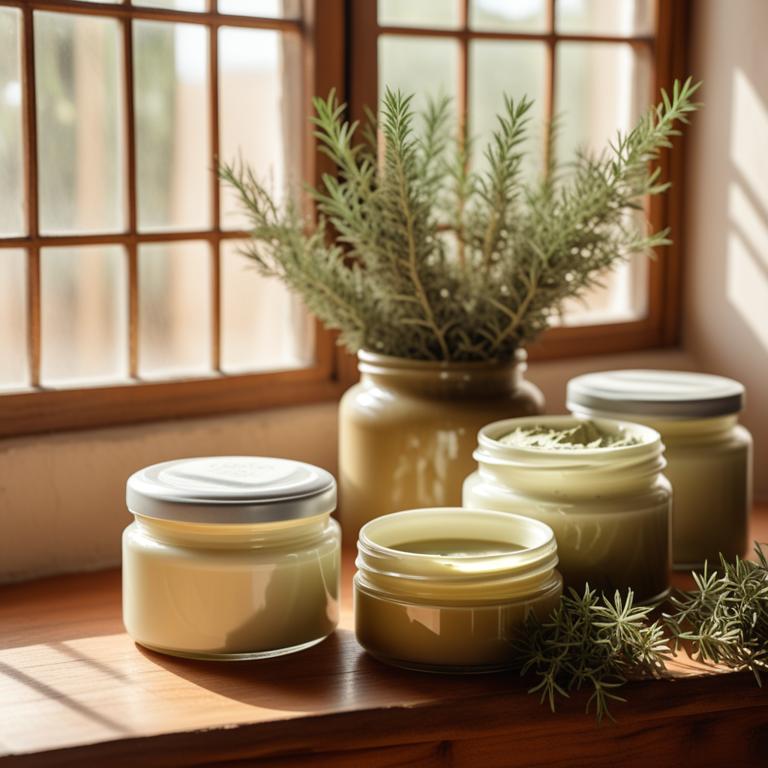
Melaleuca alternifolia creams, derived from the leaves of the tea tree plant, have been traditionally used to treat dry scalp ailments such as dandruff and itchiness due to their anti-inflammatory, antifungal, and antibacterial properties.
These properties help to soothe and calm the scalp, reducing redness and irritation, and preventing the growth of fungal and bacterial infections that can exacerbate the condition.
The bioactive constituents of Melaleuca alternifolia creams, including terpinen-4-ol and cineole, have been shown to be responsible for their therapeutic effects, helping to reduce inflammation and promote a healthy scalp environment.
Regular use of Melaleuca alternifolia creams can provide long-term benefits, including reduced flaking, improved scalp health, and a decrease in the risk of scalp infections.
Related Study
According to the information from the peer-reviewed scientific literature, Melaleuca alternifolia creams for dry scalp have been shown to have antifungal, antiviral, antibacterial and acaricidal activity, which can help combat skin infections such as acne, herpes and scabies.
4. Urtica dioica creams
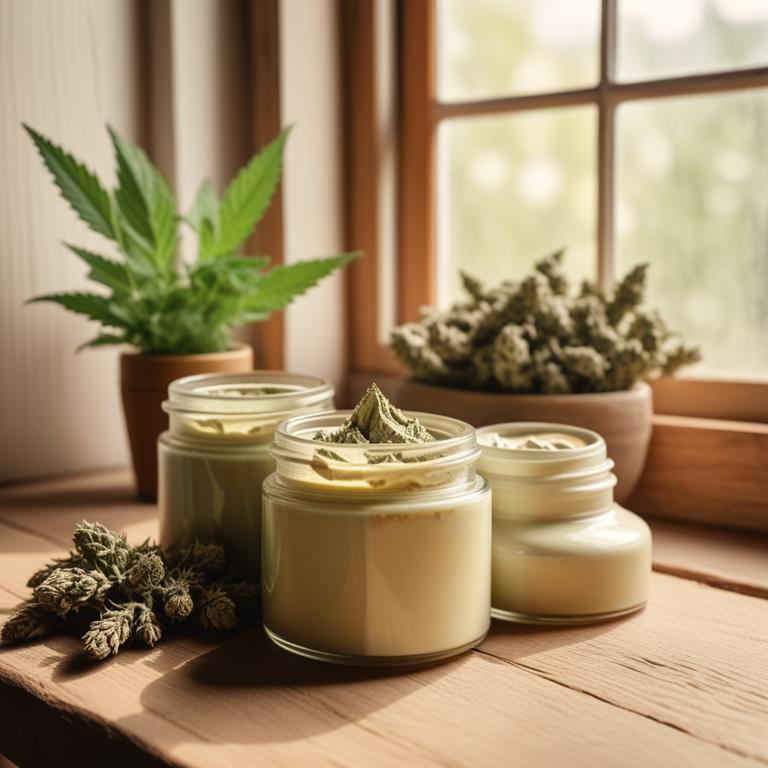
Urtica dioica creams, also known as nettle creams, have been traditionally used to treat dry scalp ailments such as dandruff and eczema due to their anti-inflammatory and soothing properties.
The bioactive constituents of Urtica dioica, including flavonoids, alkaloids, and triterpenoids, help to reduce inflammation and itching associated with dry scalp conditions.
The creams help to treat this ailment by providing a protective barrier on the scalp, reducing irritation, and promoting healthy skin cell growth.
The benefits of using Urtica dioica creams to treat dry scalp ailments include reduced inflammation, alleviated itching, and improved scalp health, making it a popular natural remedy for these conditions.
5. Calendula officinalis creams
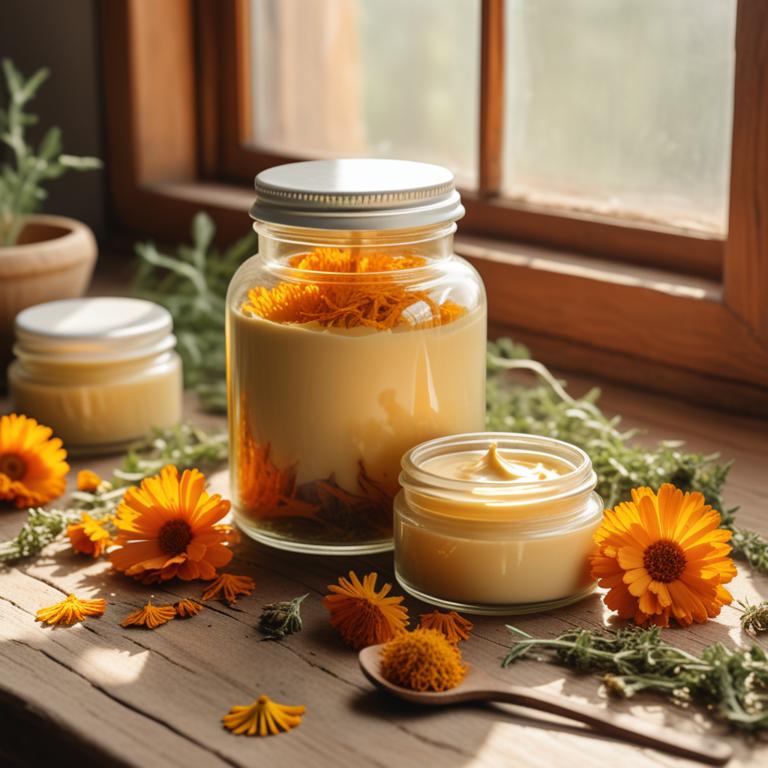
Calendula officinalis creams have been traditionally used to treat the dry scalp ailment, also known as dandruff, due to their anti-inflammatory and antimicrobial properties.
The bioactive constituents of Calendula officinalis, such as triterpenoids, flavonoids, and carotenoids, help to soothe and calm the irritated scalp, reducing inflammation and promoting healthy skin regeneration.
By applying Calendula officinalis creams to the affected area, individuals can experience relief from the symptoms of dry scalp, including itchiness, flakiness, and redness, while also promoting a healthy scalp environment.
The benefits of using Calendula officinalis creams for dry scalp include reduced inflammation, improved skin health, and a decrease in the severity of symptoms.
Related Study
According to "Roumanian archives of microbiology and immunology", Calendula officinalis creams for dry scalp may be beneficial due to their antioxidant properties, which help in reducing inflammation and scavenging reactive oxygen species, potentially soothing and calming an irritated scalp.
6. Hypericum perforatum creams
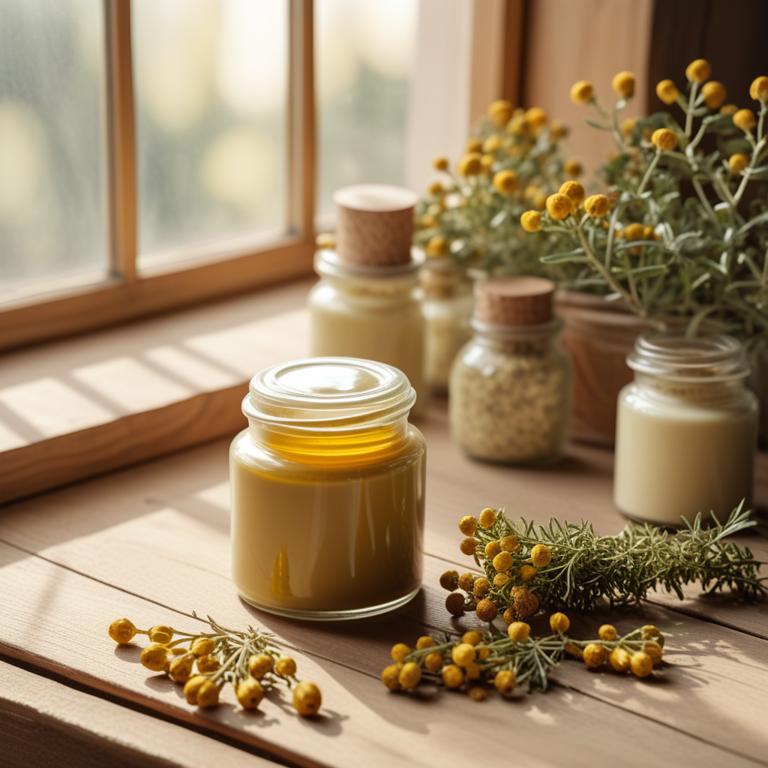
Hypericum perforatum creams, also known as St. John's Wort creams, have been traditionally used to treat dry scalp ailments such as dandruff and eczema.
The anti-inflammatory and antiseptic properties of this herbal preparation help to soothe and calm the irritated scalp, reducing redness and flakiness.
The bioactive constituents of Hypericum perforatum, including flavonoids and terpenoids, have been shown to exhibit antifungal and antibacterial properties, which aid in treating fungal infections and bacterial imbalances that can contribute to dry scalp conditions.
Regular use of Hypericum perforatum creams can help to provide relief from dry scalp symptoms, promote a healthy scalp environment, and even out skin tone, making it a beneficial natural remedy for individuals struggling with this common ailment.
Related Study
According to "BMC veterinary research", Hypericum perforatum creams for dry scalp may have potential benefits due to their antibacterial and antifungal effects.
7. Santalum album creams
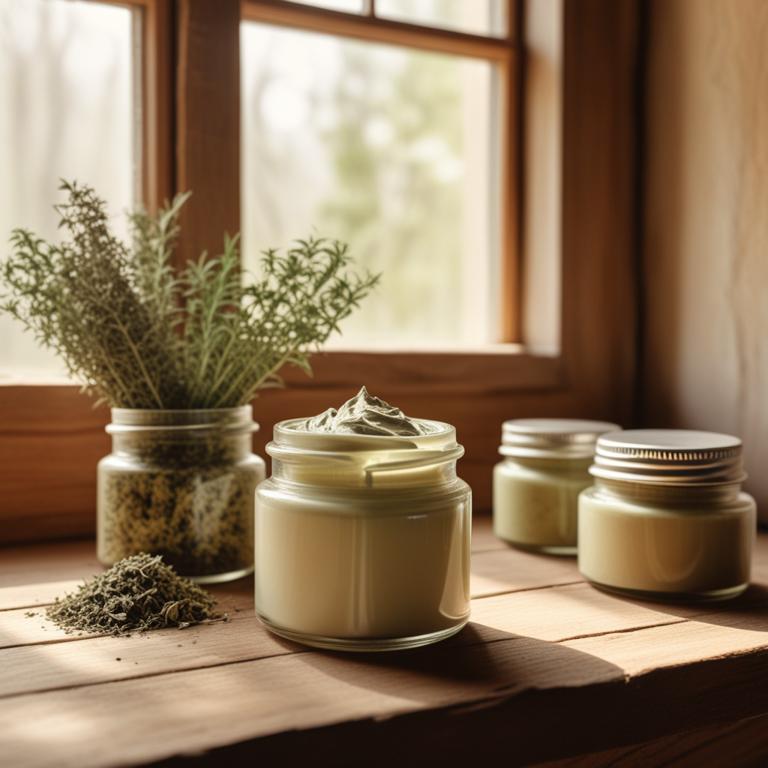
Santalum album creams have been traditionally used to treat dry scalp ailments due to their anti-inflammatory and antifungal properties, which help to soothe and calm irritated scalps.
The bioactive constituents of Santalum album, including santalol and linalool, exhibit antimicrobial activity that inhibits the growth of fungi and bacteria that contribute to dry scalp conditions.
By reducing inflammation and preventing the overgrowth of pathogens, Santalum album creams help to promote a healthy scalp environment, alleviating symptoms such as itchiness and flakiness.
The benefits of using Santalum album creams for dry scalp treatment include reduced inflammation, improved scalp health, and a decrease in the risk of further infection.
8. Cymbopogon citratus creams
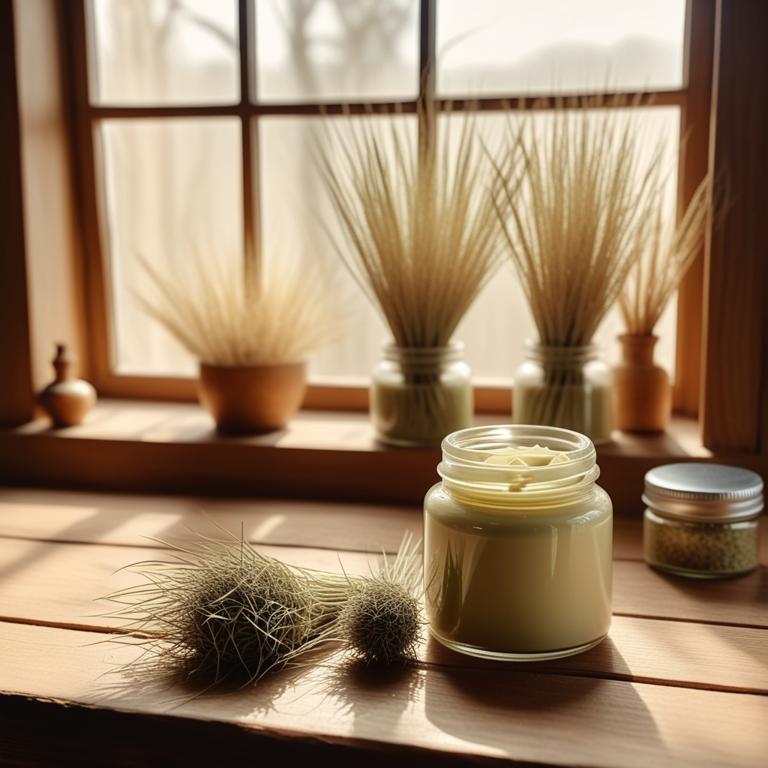
Cymbopogon citratus creams, derived from the herb lemongrass, have been found to be effective in treating the dry scalp ailment, also known as dandruff.
The anti-inflammatory and antifungal properties of these creams help to soothe and calm the irritated scalp, reducing flaking and itching.
The bioactive constituents, including citral and geranial, have been shown to exhibit antimicrobial activity, thereby controlling the growth of fungal species that contribute to dandruff.
The benefits of using Cymbopogon citratus creams include reduced flaking, improved scalp health, and a decrease in the symptoms associated with dandruff, making it a popular natural remedy for this common condition.
9. Melissa officinalis creams
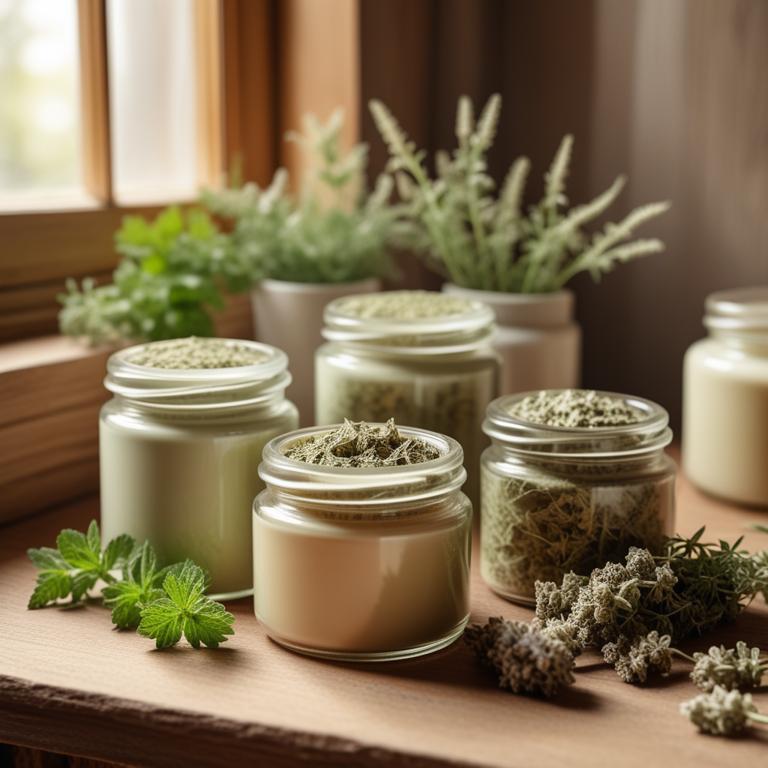
Melissa officinalis creams have been used to treat the dry scalp ailment, known as dandruff, due to their anti-inflammatory and antifungal properties.
The soothing and calming effects of Melissa officinalis creams help to reduce irritation and itching associated with dandruff, promoting a healthy scalp environment.
Bioactive constituents such as linalool and linalyl acetate in Melissa officinalis creams possess antifungal and antiseptic properties that help to control the growth of microorganisms that contribute to dandruff.
By using Melissa officinalis creams, individuals can benefit from improved scalp health, reduced flaking, and a more balanced scalp microbiome.